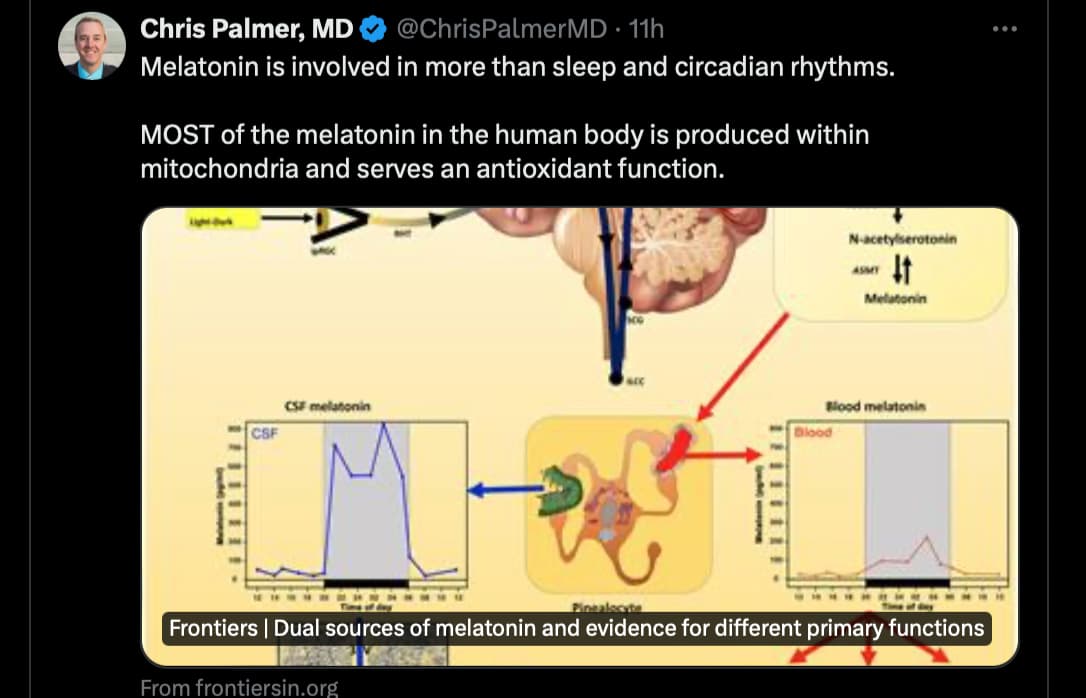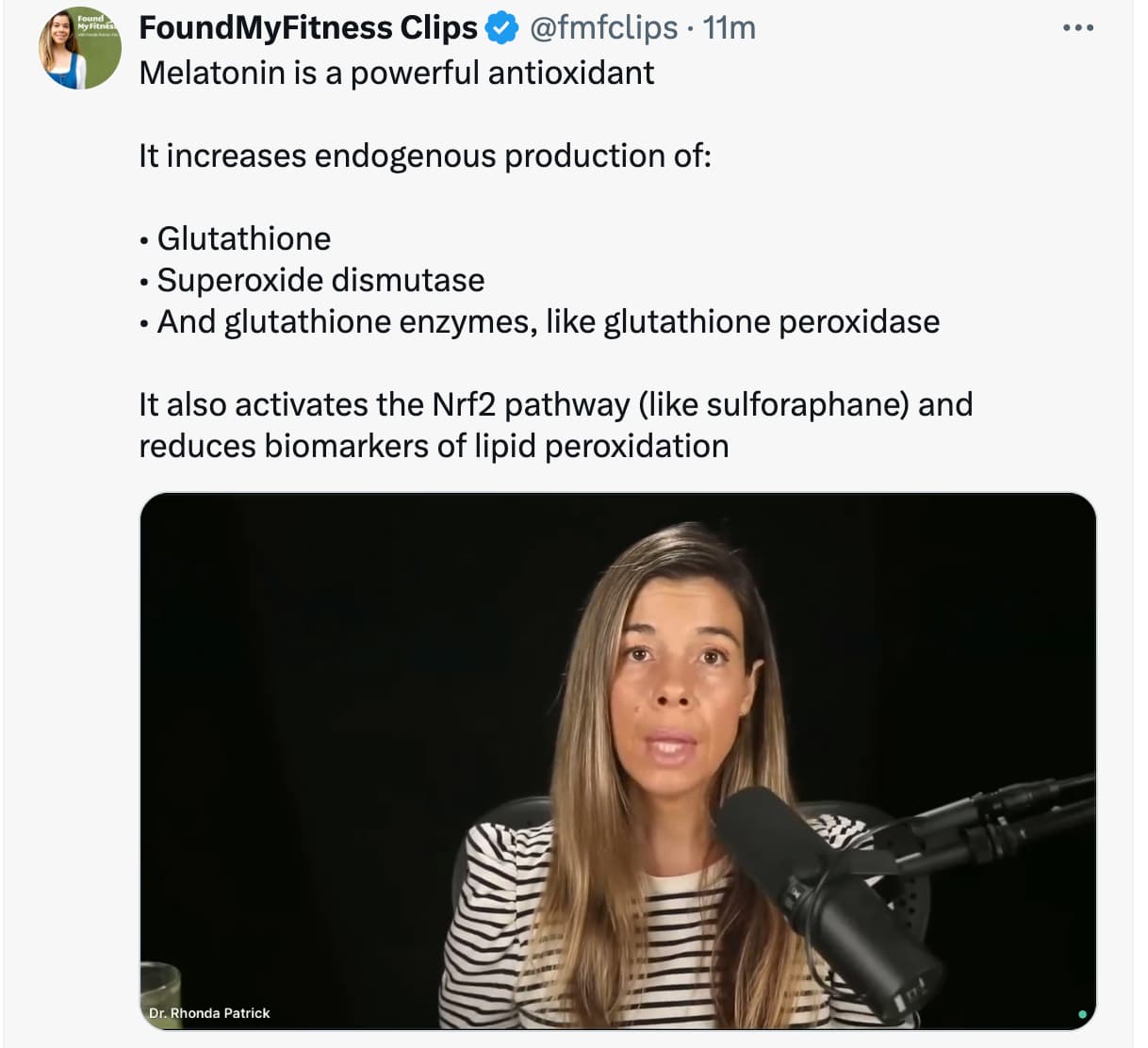The thing to understand about pineal melatonin is that it is an anti oxidant as well as driving the circadian rythm. Initially the pineal injects a lot into the third ventricle of the cerebrospinal fluid (maybe all). When people fall asleep their blood pressure goes down and their brain is washed with this melatonin (which is a higher concentration than in blood).
It then comes gradually out of the CSF into serum and can be taken up by cells across the body.
One key benefit of sleep is the additional melatonin the brain and body gets via the pineal.
I have not audited the way the calculations are done about pineal production, but it is clear to me that melatonin is helpful. I think it resists mtDNA heteroplasmy.
" When people fall asleep their blood pressure goes down and their brain is washed with this melatonin (which is a higher concentration than in blood)."
https://www.nature.com/articles/s41593-024-01638-y
“Moreover, we show that brain clearance is markedly reduced, not increased, during sleep and anesthesia.”
Yes. Interesting. Another “it makes too much sense to not be true” turns out to not be true.
https://www.bu.edu/eng/2019/11/01/are-we-brain-washed-during-sleep/
New research from Boston University suggests that tonight while you sleep, something amazing will happen within your brain. Your neurons will go quiet. A few seconds later, blood will flow out of your head. Then, a watery liquid called cerebrospinal fluid (CSF) will flow in, washing through your brain in rhythmic, pulsing waves.
The study, published on October 31 in Science, is the first to illustrate that the brain’s CSF pulses during sleep, and that these motions are closely tied with brain wave activity and blood flow.
The article does not mention melatonin. However, all I have said is sourced from the literature. Much that I don’t mind being asked to substantiate it.
I don’t doubt at all. But did you read the research I posted? It has just been published.
It will need quite a bit of reading. I have glanced at it. The role of melatonin is as an anti-oxidant. Hence diffiusion is sufficient.
Those authors observed that fluorescent dyes injected into the cerebrospinal fluid (CSF) via the cisterna magna penetrated further into the cortex during sleep and anesthesia. They interpreted this as showing that molecular movement into the cortex must be faster during these states. However, the concentration of dye in any brain region will always be the difference between its rate of arrival and its rate of departure and so increased dye penetration in sleep and anesthesia can be equally well explained by a reduced rate of clearance rather than an increased rate of entry.
I don’t have a formal nightly dosing. I aim, however, to take a few hundred mllligrams at least per night. As part of my discussions with the hacking aging group I have concluded that it is slightly likely that puberty is driven by increased mitochondrial heteroplasmy and that is held back by melatonin. As heteroplasmy is one of the key causes of age based disease (although probably senescence comes close as well) I am inclined to higher rather than lower doses of melatonin.
John - I’m curious as to what happens to your various sleep measurements, HRV, Deep, REM, etc with this. Are you sleepy next day?
I’ve been putting @250mg of bulk powder in a delayed release capsule lately and sleeping really well. My sleep score has improved per my Fitbit to the 90-95 range from the mid 70’s-80’s fwiw. I don’t notice any negative impacts from this dosing the following day. I have a 20+ year history of on and off shift work so sleep has been my Achilles Heel for most of that time.
I have no experience with megadosing Melatonin. I have patients that have come to me already on it, generally for trying to stave off progression of a stage IV malignancy. Why are others doing the megadosing - as a summary - guess I might just need to read the 190 messages above this?
I originally started melatonin for sleep and then I learned about it possibly being helpful for inflammation, aging & menopause so I started experimenting with higher doses. It does seem beneficial and I’ve not noticed any negatives except when I dosed it during the day a few times which felt a bit depressing.
So John - when you have alcohol, and then take 100-200 mg of melatonin - do you see the negative effects typical of alcohol on your sleep (e.g. increased resting HR, decreased HRV, messed up deep/REM sleep) of do these seem to be mitigated or reversed with this?
I am not sleepy the next day. Yesterday i did an experiment with just over 2g. I am aiming for a lot less today. I have not noticed anything yet, but i get big shifts with alcohol which makes minor shifts hard to spot. Rhr now is 49 yesterday was 48. Sleeping fitbit hrv 30ms both nights, but thats an odd measure.
The problem is that i take pantethine DHM and melatonin. Apart from me feeling better the various measurements are i think better. Drinking days currently have an RHR in the low 50s which drops to 50 or below on non drinking days. Prior to taking melatonin when i start drinking i would perhaps get to an RHR of 60 after a few days. I am, however, taking quite a bit of 2-oxoglutarate at the moment as well, but every day. Polar HRV is in the upper 50s.
My reason beyond sleep is prevention of increased mtDNA damage.
You’re a smart guy, @John_Hemming, and very conscientious of your health. But you seem to drink a lot. This is none of my business, and I wouldn’t have brought it up if you hadn’t mentioned it so often. You may be one of those people who can easily tolerate large amounts of alcohol. Nevertheless, how do you reconcile the drinking on one hand and your pursuit of longevity on the the other? I think they run at cross purposes to each other.
Forgive my intrusiveness, but I think we’re all in this together. All of us are learning from each other, and we will all succeed or fail as one.
I dont mind the question. Firstly i quite like drinking. Secondly it is pleiotropic. Acetaldehyde is particularly harmful, acetate at a level of say 1 millimolar can be quite helpful. Ethanol itself is not so much of an issue. Hence if the harm can be minimised then that factor in the decision-making is lessened. I do a lot of measurements including weekly blood tests. On those my health has improved.
Everyone is in the end responsible for their own decisions and no one should be under the illusion that alcohol is inherently good even with mitigating molecules. However on a risk return basis I continue to have drinking days.
My main issue with it is that I am less disciplined on food when i drink.
It is however very obvious from biomarkers when i am drinking. My RHR has adjusted during the night and is now 47. It would not be that low had I drank alcohol yesterday or on monday.
I mention it simply because it is relevant to the measurements, because it has an effect on my measurements I adjust for the effect to work out whether the effect is increasing or reducing. At the moment the effect is reducing. I am, however, still juggling up when next I will have a drink. That might be today, but also I may leave it for a few days.


